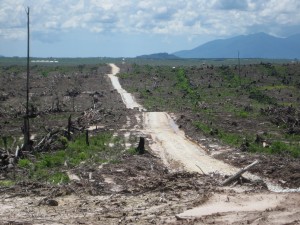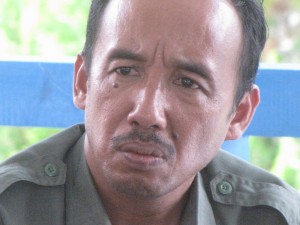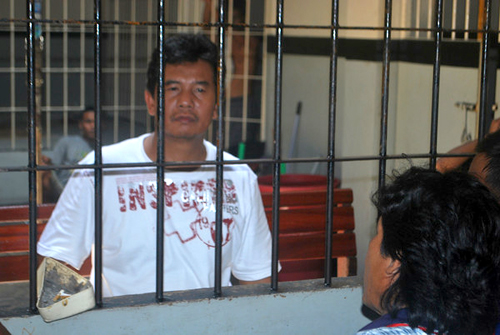
I’ve spent the past week visiting our partners in Indonesia and interviewing frontline communities directly impacted by the palm oil industry. The stories I’ve heard are haunting — tales of human rights abuses, negligent environmental destruction and the criminalization of Indigenous Peoples for trying to maintain some connection to their ancestral lands despite degradation caused by palm oil companies.
For example, just two weeks ago Sinar Mas converted 20,000 hectares of forest into palm oil plantations in the Sintang District of Borneo, and as a result 32,000 people became refugees — something that happens all the time here and rarely gets reported on in the U.S.
When companies like Cargill, Sinar Mas or Duta Palma bulldoze rubber plantations or community farms owned by Indigenous communities, the village leaders call Walhi for support. As I was hanging out in Walhi Kalbar last week, a car full of Dayak men (Indigenous Peoples of Indonesia) arrived at the office with their lawyer. They were just returning from the local jail where Pak Josef Suez, their community leader, was being held due to a land dispute case with the palm oil company in his community, Borneo Ketapang Permai (BKP). Both KML and BKP are subsidiaries of First Resources Limited palm oil company through a joint venture.

Pak Miguel Deban and Pak Sariano shared their struggle with me:
In 2000, the palm oil company Karya Mufakat Lestari (KML) came to our village, Sei Ilai, in the Sanggau District [in northern Borneo near the border with Sarawak/Malaysia], promising us a better life. They promised to bring our kids a better education, new houses, a new church, and new streets.
So we made a smallholder scheme agreement with KML in which we gave our ancestral lands to the company to develop oil palm plantations and we would manage a portion of them. In our district the people agreed to give KML 7,000 hectares of land, and that for every 10 hectares of land, 4 hectares would be cared for by the people and 6 by the company. But after we gave our land to KML, the company collapsed.
Our village leader, Pak Suez, saw that KML was neglecting their palm plantations on his ancestral land. Seeing that the palm plantations were dying, Pak Suez took the initiative of caring for the plantations because he felt it was his own land so he replanted 1,000 oil palm plants on his own. He spent 500 million Rupiah.
Another palm oil company, BKP, bought out KML but this was not communicated to any of the Indigenous Peoples in the area, not by the company nor by the Bupati [district head]. As far as we knew, the company changed their name to BKP. When the new company, BKP, took over, the communities didn’t understand that KML and BKP had different smallholder scheme rules. For example, BKP didn’t honor the 4/6 hectare people/company ownership ratio. BKP never sat down with the community to make a new agreement and yet they have put Pak Suez in jail because they claim he has taken over 40 hectares of land without permission. Pak Suez feels cheated by the company since he spent 500 million Rupiah replanting his palm plantations and the company only wants to pay him 175 million Rupiah. Pak Suez would be cheated out of what BKP owes him if he had silently settled.

On May 27, 2010 the Bupati called a meeting between BKP and the community, but there was no resolution. On August 26 there was another meeting and BKP tried to reach a new agreement with the community but, fearing more lies, the community did not budge. Pak Suez has now been in jail for almost two weeks.
Pak Miguel Deban, Pak Sariano, Pak Suez’s 16 year-old son, and the other community members I met yesterday traveled 7 hours from their rural village to visit Pak Suez in the Pontianak jail and to meet with his lawyer.
According to the community members, the company’s strategy is to use intimidation to make the families in the Sanggau District fear them. Hundreds of families are now blockading their lands from palm oil companies, and Pak Miguel says that the company will only free Pak Suez from jail if the families stop blocking their land.
It turns out that this smallholder case of social conflict in the Sanggau District is a template for what’s going on across Borneo between palm oil smallholders or non-palm oil traditional land holders and palm oil companies. (In particular it sounds a lot like what happened to the community of Semunying Jaya.) The process of establishing large-scale oil palm plantations is irreversible: Indigenous Peoples contribute their lands and labor to oil palm schemes but lose sovereignty over those lands and natural resources that are central to their identity as Indigenous Peoples.